
President Lazarus Chakwera has assented to the controversial Labour Relations (Amendment) Act which critics say infringes on the right of employees to take industrial action.
Chakwera’s press secretary, Anthony Kasunda, has confirmed that the president has approved four bills which were passed by Parliament in July this year.
The bills have now turned into acts of Parliament. They are Labour Relations (Amendment) Act, Employment (Amendment) Act, Constitution Amendment and Parliamentary Service.
The Labour Relations (Amendment) Act provides for an employer’s right to deduct wages from an employee who is on strike. Employees will be paid for the first three days of strike per year but after the three days of strike are used up, wages will be deducted from the employees.

The act also clarifies the categories of essential services to which the right to strike and lockdown does not apply. It further does away with the requirement of employer and employee panellists in the Industrial Relations Court.
In July, labour activists demanded Chakwera not to assent to the controversial legislation saying it infringes on the rights of workers. They also argued that consultations were not conducted before the bill was tabled in Parliament.
However, Deputy Minister of Labour Vera Kamtukule claimed that consultations were conducted. She also defended the new law saying the concept of “no work no pay” does not restrict people from striking.
She added that international best practices provide that unions collect money from members and this money is used to pay workers when they are striking.
“People are free to strike as they want but during this period the employer will not pay them,” she said. “Union members should take their union leaders to account for the money that they are collecting.”
The employment (Amendment) Act abolishes tenancy labour and places a K5 million fine on those flouting the provision while the Constitution Amendment Bill creates the position of Deputy Chief Justice at the Judiciary.
The Parliamentary Service law turns the Parliamentary Service Commission into a constitutional body just like the Malawi Electoral Commission and it also increases the tenure of Defence and Security Committee of Parliament from one year to 2.5 years.















http://Www.kuzuza anthu.com